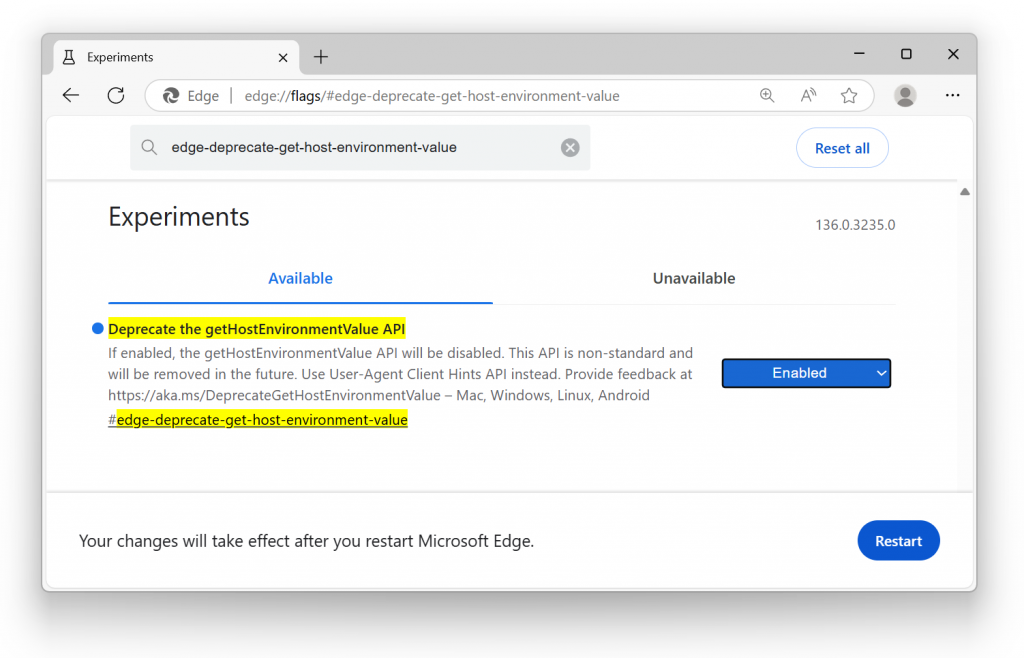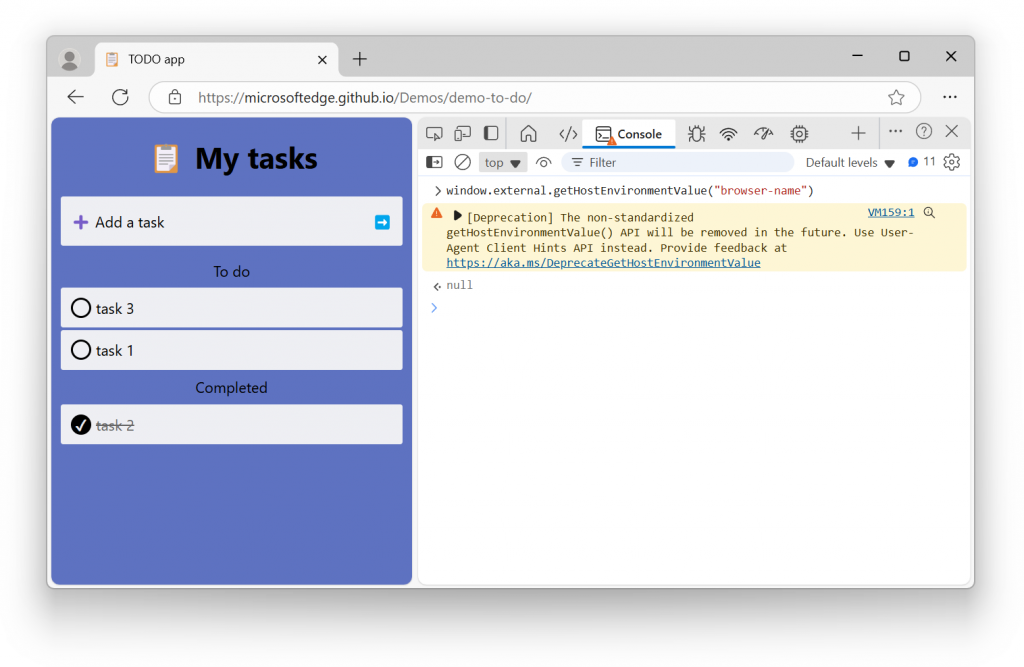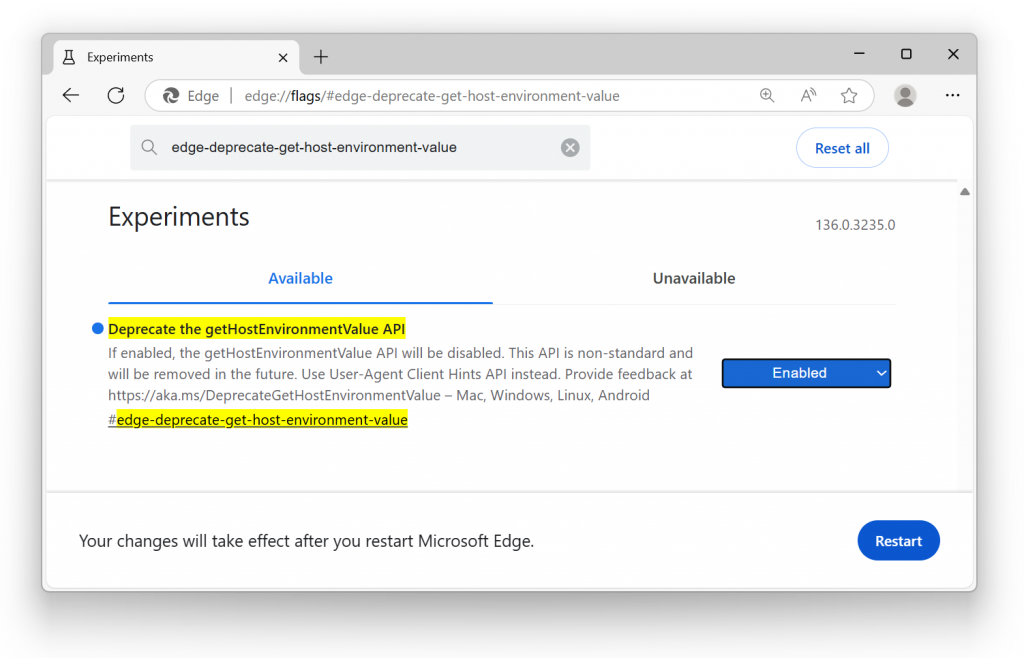window.external.getHostEnvironmentValue() method is an Edge-only, non-standards-based way for web developers to access information about the browser and platform. In this article, we’re announcing our plan to deprecate this method and we’re asking web developers to use the standardized User-Agent Client Hints API instead.
Our decision to deprecate the getHostEnvironmentValue() method is driven by our goal to enhance browser privacy by eliminating user fingerprinting. The UA Client Hints API provides browser and platform information in a much more privacy-preserving way as browsers can decide what to return when asked for hints. Low entropy hints are accessible with every request, while the high entropy hints that can potentially give away more fingerprinting information can be gated with user preferences or behind a permission request.
To learn more about User Agent Client Hints, see User-Agent Client Hints API, at MDN.
Our deprecation plan
To reduce interoperability issues and to gather feedback, we’re planning to deprecate the non-standard getHostEnvironmentValue() method by following these steps:
| Edge version | Release date | Deprecation step |
|---|---|---|
| Edge 135 | April 3, 2025 | The DevTools Console warns developers when their code uses the method. Developers can also use a feature flag to test their sites with the method disabled. |
| Edge 137 | May 23, 2025 | The method is disabled but can still be used by requesting a temporary extension for your domain. |
| Edge 141, depending on developer feedback | October 2025 | The method is fully removed from Edge. |
As the table above shows, our deprecation plan starts with Edge 135. At that point, the method will still be present, but developers will be warned against using it and will be able to test its removal early. In Edge 137, we will disable the method but also provide developers with a temporary way to enable it on their websites, while they change their code. And finally, we plan on completely removing the legacy method with Edge 141. This plan might change depending on the feedback that we receive during this deprecation process.
Testing the deprecation early
Starting with Edge 135, you can test whether your website still functions correctly without the getHostEnvrionmentValue() method. This way, you can test for potential breakages early and fix your code before the method is removed.
To temporarily disable the getHostEnvironmentValue() method locally in Microsoft Edge, use the edge-deprecate-get-host-environment-value flag:
- Open a new Edge window or tab.
- Go to
edge://flags/#edge-deprecate-get-host-environment-valuein that tab. - From the drop-down menu, select Enable.
- Restart Microsoft Edge.

DevTools warning
Starting with Edge 135, we’re also making it easy for you to know if your site uses the legacy method. As part of the deprecation process, Microsoft Edge will display a warning in the DevTools Console tool for any sites that still use getHostEnvironmentValue():

Requesting a support extension for your site
Finally, if your website depends on the getHostEnvironmentValue() method, and you need more time to remove this dependency, you can request a temporary extension of the support for the API for your domain. To do this, please reach out to us by filling the Feedback on Deprecation of Get Host Environment Value API form.
In the form, please tell us which domain name you need the API to work on and why you still need access to it. We would love to know more about how you use the API, so that we can improve the User Agent Client Hints API and understand use cases that may not be already covered by other existing web platform APIs.
Note that we only plan to allow per-domain extensions of the API until Edge 141, which ships in October 2025.
Alternatives to getHostEnvironmentValue
The getHostEnvironmentValue() method provides access to four properties in Microsoft Edge. The following table shows which standards-based alternatives, if any, you can use instead:
Properties provided by getHostEnvironmentValue() |
Standards-based alternatives |
|---|---|
os-architecture |
Sec-CH-UA-Arch Client Hint or getHighEntropyValues(). |
os-build |
Sec-CH-UA-Platform-Version Client Hint or getHighEntropyValues(). The returned version indicates the API Level of the Windows platform, as referenced here. |
os-mode |
No functional equivalence. |
os-sku |
No functional equivalence. |
If your use case isn’t covered by the User Agent Client Hints API, please let us know by filling out the Feedback on Deprecation of Get Host Environment Value API form.
As you start using the standards-based User-Agent Client Hints API and find bugs or limitations, please create new issues on the Chromium’s bug tracker.

